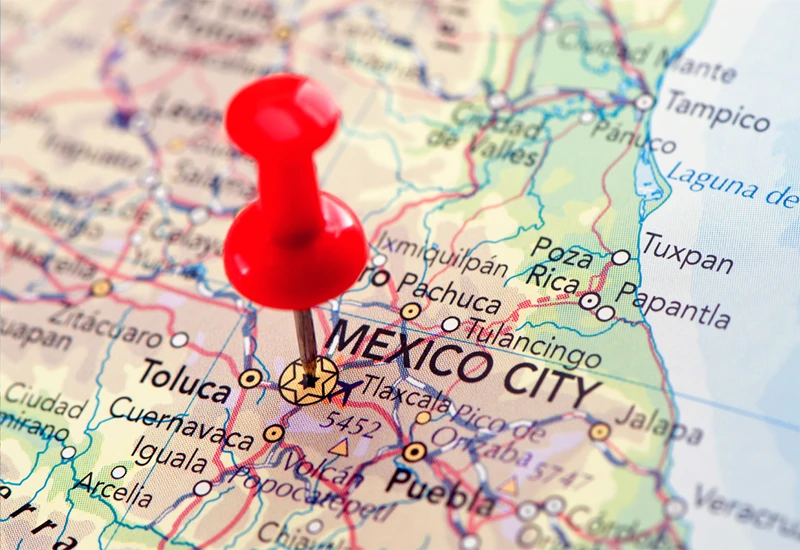Outsourcing to Mexico is becoming increasingly attractive to US companies, positioning it as a premier destination for their outsourcing needs.
This strategic shift is not only influenced by Mexico’s geographical proximity but also its remarkable pool of talent, significant cost advantages, and an operational timezone that aligns closely with US business hours.
As businesses strive to optimize operations while maintaining quality and efficiency, Mexico emerges as a compelling choice in the evolving world of global outsourcing.
Benefits of Outsourcing to Mexico – Why It’s a Top Outsourcing Destination
Mexico is emerging as a top choice for businesses looking to optimize their operations without compromising on quality. Several factors contribute to Mexico’s rising popularity as an outsourcing destination. Let’s delve into the multifaceted advantages that position Mexico at the forefront of the outsourcing industry:
1. Cost Savings without Compromise
One of the primary motivators for outsourcing is the potential for cost reduction, and Mexico stands out by offering substantial savings without sacrificing quality. The cost of labor in Mexico is competitive, especially when compared to the United States and other outsourcing destinations. This affordability extends to operational costs, including infrastructure and logistics, making it a financially viable option for companies aiming to streamline expenses. However, the appeal of Mexico goes beyond mere cost-cutting; it’s about achieving cost-effectiveness. Businesses can leverage the cost advantages to access skilled labor and high-quality services, ensuring that savings do not come at the expense of the project’s success.
2. A Pool of Highly Skilled Talent
Mexico’s education system has made significant strides in producing graduates with skills tailored to the global market, particularly in technology, engineering, and business. The country boasts a growing number of professionals who are not only technically proficient but also adaptable to the dynamic demands of international projects. This talent pool is further enriched by continuous professional development and specialization, ensuring that businesses outsourcing to Mexico have access to a workforce capable of handling complex tasks with expertise. Moreover, the emphasis on bilingual education has increased the number of English-speaking professionals, facilitating smoother communication with international clients.
3. Time Zone Alignment for Seamless Collaboration
Geographical proximity to the United States is a logistical advantage that Mexico offers, but the real benefit lies in the overlapping time zones. This alignment facilitates real-time communication and collaboration, allowing US-based companies and their Mexican counterparts to work together more efficiently. Meetings, updates, and decision-making processes are streamlined, as teams can interact within common working hours. This synchronization not only enhances productivity but also fosters a sense of unity and immediacy that is often missing in offshore outsourcing arrangements.
4. Cultural Affinity and Business Compatibility
Cultural compatibility is a critical factor in the success of outsourcing partnerships. Mexico and the United States share a long history and cultural ties, which are reflected in the business environment. Mexican professionals are familiar with US business practices, consumer preferences, and corporate culture, making the integration of outsourced teams smoother and more natural. This cultural affinity minimizes misunderstandings and fosters a collaborative spirit, enabling more effective problem-solving and innovation. Businesses benefit from a partnership that understands not just the technical requirements of a project but also the subtleties of the target market.
5. Strategic Geographical Location
Mexico’s strategic location offers more than time zone advantages; it provides logistical benefits that are crucial for companies with physical goods and services. Proximity to the US border reduces shipping times and costs, making Mexico an attractive option for manufacturing and supply chain operations. This geographical advantage is complemented by Mexico’s extensive network of trade agreements, facilitating easier and more cost-effective access to global markets. Companies looking to enhance their global footprint find in Mexico a gateway that combines operational efficiency with strategic market access.
6. A Robust Legal Framework for Outsourcing
Navigating the legalities of outsourcing can be complex, but Mexico’s commitment to creating a favorable business environment is evident in its legal framework. The country has implemented regulations that protect intellectual property, ensure data security, and provide clear guidelines for labor and employment practices. These measures provide a level of assurance for businesses, knowing that their operations are supported by a legal system that understands the nuances of international outsourcing. Additionally, the ongoing efforts to update and refine these regulations demonstrate Mexico’s dedication to maintaining its position as a competitive and secure outsourcing destination.
7. The Emergence of Technology and Innovation Hubs
Mexico is not just about traditional outsourcing services; it’s also carving a niche in the tech and innovation sector. Cities like Guadalajara, Monterrey, and Mexico City are becoming known as technology hubs, attracting investments and fostering startups that contribute to a vibrant digital ecosystem. This environment encourages innovation and technological advancement, making Mexico an exciting option for companies looking to outsource software development, IT services, and creative digital solutions. The presence of these hubs signals Mexico’s readiness to meet the future demands of the outsourcing industry.
Key Sectors: What Are The Top Outsourcing Industries in Mexico?
Mexico has several key industries emerging itself as leaders in the global market. This variety reflects Mexico’s ability to cater to a broad spectrum of outsourcing needs, leveraging its skilled workforce and infrastructure to provide specialized services across different sectors. Below, we explore the key industries that have positioned Mexico as a preferred destination for outsourcing:
IT and Software Development
The Information Technology sector in Mexico has seen rapid growth, driven by a surge in demand for software development, mobile app development, and IT services. With a robust educational system churning out skilled IT professionals and engineers, Mexico offers a wealth of talent in programming, cybersecurity, and cloud computing. Companies looking to outsource their IT operations can benefit from Mexico’s pool of tech-savvy professionals who are proficient in the latest technologies and programming languages. This industry’s growth is further fueled by the government’s support for IT education and the establishment of technology parks that foster innovation and collaboration.
Manufacturing and Automotive Sectors
Mexico has long been recognized as a powerhouse in manufacturing, with a particular emphasis on the automotive industry. The country’s strategic location, favorable trade agreements, and competitive labor costs make it an ideal choice for manufacturing operations. Automotive companies, from OEMs (Original Equipment Manufacturers) to suppliers of parts and components, find in Mexico the capabilities to support their entire production cycle. This sector benefits from Mexico’s well-established supply chain networks, state-of-the-art manufacturing facilities, and a workforce skilled in advanced manufacturing techniques.
Customer Service and Back-office Support
Outsourcing customer service and back-office operations to Mexico allows companies to provide high-quality support while managing costs effectively. The country’s workforce is known for its strong customer service orientation, language skills, and familiarity with North American culture, making it well-suited for roles in call centers, help desks, and administrative support. The nearshore advantage of Mexico ensures that these services are delivered within similar time zones to North American clients, enhancing responsiveness and service levels.
Creative and Digital Marketing
Outsourcing marketing professionals in Mexico is on the rise, buoyed by a young, dynamic workforce with a global perspective. Mexican professionals in this industry offer services ranging from graphic design and branding to digital marketing and content creation. Companies can tap into Mexico’s marketing talents to gain fresh perspectives and innovative approaches to marketing, benefiting from culturally resonant campaigns that engage global audiences. This industry’s growth is testament to Mexico’s ability to adapt and excel in the rapidly evolving digital landscape.
Legal Considerations: Navigating Mexico’s Outsourcing Regulations
When expanding outsourcing operations to Mexico, understanding the legal and regulatory landscape is crucial. It’s important to ensure compliance and leverages the benefits of outsourcing within the framework of Mexican law. Here, we outline the most popular legal and regulatory considerations businesses must consider.
Employment Laws and Regulations
Mexico has specific laws governing employment relationships, including outsourcing arrangements. The Federal Labor Law (Ley Federal del Trabajo) outlines the rights and obligations of employers and employees, including minimum wage, working hours, and termination procedures. Recent reforms have tightened regulations around outsourcing, particularly prohibiting personnel subcontracting where the sole purpose is to evade legal obligations to employees. Companies must ensure their outsourcing practices comply with these laws, focusing on proper classification of workers and adherence to labor rights.
Tax Implications for Outsourcing
Outsourcing in Mexico comes with specific tax considerations. The Mexican tax authority (SAT) has implemented measures to prevent tax evasion in outsourcing arrangements. Companies must comply with tax obligations, including income tax and Value Added Tax (VAT) implications of outsourcing services. Proper documentation and adherence to tax reporting requirements are essential to avoid penalties and ensure a smooth operational flow.
Data Protection and Privacy Laws
Mexico’s Federal Law on the Protection of Personal Data Held by Private Parties (LFPDPPP) regulates the processing of personal data. Companies outsourcing to Mexico must ensure their partners comply with data protection laws, safeguarding personal information against unauthorized access and breaches. This includes implementing appropriate security measures and notifying data subjects about the processing of their data.
Intellectual Property (IP) Rights
Protecting intellectual property is also a concern for companies outsourcing to Mexico. The Mexican Institute of Industrial Property (IMPI) oversees IP rights, including patents, trademarks, and copyrights. Businesses must ensure that contracts with outsourcing providers include clauses that protect IP rights, clarify ownership of developed IP, and outline procedures for handling IP infringements.
Compliance with International Standards
Businesses operating in Mexico must also consider compliance with international standards and certifications, especially if they serve global markets. This includes ISO certifications, IT security standards like ISO/IEC 27001, and industry-specific regulations such as the Health Insurance Portability and Accountability Act (HIPAA) for healthcare-related outsourcing. Ensuring that outsourcing partners in Mexico meet these standards is essential for maintaining quality and compliance across borders.
Environmental Regulations
Mexico has enacted various environmental laws and regulations that companies must consider when outsourcing manufacturing or processes with potential environmental impacts. Compliance with environmental standards, waste management regulations, and sustainability practices is crucial to operate responsibly and avoid legal repercussions.
Navigating NAFTA/USMCA Provisions
The United States-Mexico-Canada Agreement (USMCA), which replaced NAFTA, includes provisions that impact outsourcing agreements, particularly in manufacturing and digital trade. Companies must understand how USMCA affects their operations, including rules of origin, digital trade protections, and cross-border data flows.
PRO TIP: Outsourcing providers specialize in navigating the complex legal and regulatory landscapes of Mexico, ensuring businesses comply while maximizing outsourcing benefits.
How to Choose the Right Outsourcing Partner in Mexico
Selecting the right outsourcing partner in Mexico is pivotal to achieving successful outcomes for your projects. A strategic approach to this selection process ensures that you find a partner who aligns with your business goals, cultural values, and quality expectations. Here are key criteria and steps to consider:
- Define Your Requirements: Clearly outline your project’s scope, technical needs, and the specific skills required. This will guide your search for an outsourcing partner that has the right expertise.
- Evaluate Their Track Record: Look for a partner with a proven history of delivering high-quality work within your industry. Testimonials, case studies, and references can provide insights into their capabilities and reliability.
- Assess Communication and Language Skills: Effective communication is crucial for the success of any outsourced project. Ensure that the partner has a team with strong English language skills and an understanding of your business communication style.
- Consider Cultural Fit: A partner that aligns with your company’s culture will facilitate smoother collaboration. Evaluate their work ethics, communication practices, and approach to problem-solving.
- Check for Compliance and Certifications: Ensure that the outsourcing partner complies with Mexican legal and regulatory standards, as well as any relevant international certifications that apply to your industry.
- Technology and Infrastructure: Evaluate their technological capabilities and infrastructure to ensure they can support your project requirements efficiently.
- Data Security and IP Protection: Assess their data security measures and intellectual property protection policies to safeguard your company’s and customers’ information.
By meticulously evaluating potential partners against these criteria, you can establish a fruitful outsourcing relationship that enhances your operational efficiency, drives innovation, and contributes to your strategic objectives.
OUTSOURCING TO MEXICO? For expert guidance on outsourcing to Mexico and connecting with top-tier remote talent, schedule a free consultation with our growth experts.
Managing Your Outsourced Team in Mexico
Navigating the management of an outsourced team in Mexico is made significantly easier with the support of experienced outsourcing providers. These providers are instrumental in overcoming common challenges and ensuring a successful collaboration. Here’s how they play a crucial role and what businesses can expect:
- Effective Communication Strategies: Outsourcing providers facilitate robust communication channels and strategies, ensuring clear and consistent interaction between your team and the outsourced personnel. This includes setting up regular meetings, updates, and leveraging technology to maintain a constant flow of information.
- Goal Alignment and Expectation Setting: They work closely with your business to clearly define project goals, deliverables, and expectations, aligning the outsourced team’s efforts with your strategic objectives. This clarity is crucial for the success of any outsourced project.
- Cultural Integration and Sensitivity Training: Recognizing the importance of cultural harmony, outsourcing providers often offer cultural sensitivity training to both the outsourced team and your internal staff. This fosters a positive work environment and seamless integration.
- Skill Development and Team Building: Providers also focus on continuous skill development and team-building activities, ensuring that the outsourced team remains motivated and aligned with your company’s values and work ethic.
- Technology and Infrastructure Support: Outsourcing firms provide the necessary technology and infrastructure, enabling effective collaboration and project management. This ensures that teams have access to the tools they need for success.
- Continuous Monitoring and Feedback Loops: Providers continuously monitor the performance of the outsourced team, providing regular feedback and making adjustments as needed. This ensures high quality and timely delivery of work.
By partnering with an outsourcing provider, companies can expect to navigate the challenges of managing a remote team with greater ease. At 1840 & Company, we not only facilitate the operational aspects but also ensure that your outsourced team is well-integrated, productive, and aligned with your company’s goals.
Conclusion
In conclusion, outsourcing to Mexico offers a compelling blend of benefits for businesses. If done properly, it can enhance their operational efficiency, offer access to a skilled talent pool, and help achieve cost savings without compromising quality. With the support of nearshore outsourcing providers, businesses can effectively manage their outsourced teams, ensuring seamless integration, effective communication, and alignment with strategic objectives. For a free consultation on outsourcing to Mexico or augmenting your existing team with dedicated freelance Mexican talent, schedule a call with us today.








